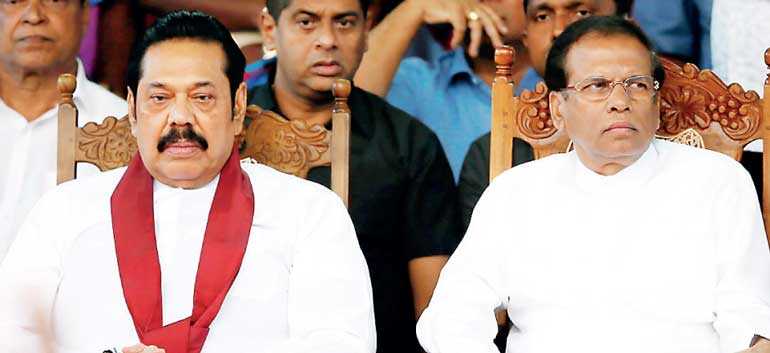Sunday Feb 22, 2026
Sunday Feb 22, 2026
Thursday, 15 November 2018 00:44 - - {{hitsCtrl.values.hits}}

President Maithripala Sirisena (right) took a major blow on 14 November as Parliament rejected his newly-appointed Prime Minister Mahinda Rajapaksa (left) – Reuters
asia.nikkei.com (Bangkok): President Maithripala Sirisena on Wednesday suffered another setback in his grab for greater Executive authority, with Parliament issuing a vote of no confidence against his chosen prime minister.
The humiliating decision, which came a day after the Supreme Court blocked a Sirisena order to dissolve the Legislature, deepens the political turmoil in the strategically important Indian Ocean country.
On Wednesday morning, in a chaotic scene, a majority of Parliamentarians in the 225-member chamber closed ranks against Sirisena’s allies in the house.
First, a motion by an Opposition lawmaker to suspend the day’s agenda and hold the no confidence vote sailed through, with more than 113 in agreement. Then, lawmakers passed the no confidence motion against the barely three-week-old Government headed by Prime Minister Mahinda Rajapaksa, a popular former president and close China ally whose terms were marked by authoritarianism.
By the end of Parliament’s morning session, 122 lawmakers had signed the no confidence document that was handed over to the speaker, rejecting the legitimacy of Sirisena and Rajapaksa’s budding arrangement.
The drama marks another worrying turn in the feud between the Executive and the Legislature. “Technically, there is no government as at right now,” Harsha de Silva, a lawmaker for the United National Party, the largest party in Parliament, told the Nikkei Asian Review. “Our numbers might be now over 120; we had at least three crossovers today.”
But Parliamentarians from Rajapaksa’s party refused to accept the result. “There was no vote; we don’t accept this,” said lawmaker Thilanga Sumathipala.
Either way, Wednesday’s developments strengthen the hand of Ranil Wickremesinghe, who heads the UNP. A onetime major coalition partner of Sirisena’s nearly four-year administration, he was prime minister until the president fired him on 26 October and replaced him with Rajapaksa.Wickremesinghe’s first taste of retribution came on Tuesday, when the Supreme Court froze Sirisena’s decree to shut down Parliament for three weeks and hold fresh general elections. The decision by the three-judge bench paved the way for Parliament to begin a new session on Wednesday.
Wickremesinghe allies were among the more than 20 petitioners who filed cases before the country’s highest courts, in what is snowballing into a battle for the future of Asia’s oldest democracy.
Many Western countries and other democracies are mounting pressure on Sirisena to act within the bounds of the constitution and secure parliamentary legitimacy. On Monday, in a diplomatic snub, eight Western governments stayed away from a meeting with Sirisena’s new Foreign Minister. Non-western democracies like South Africa and India have also been recoiling, with India sending a junior diplomat.
Still, seasoned political insiders say it is premature for Wickremesinghe and his allies to claim victory in this week’s round of score-settling. “The UNP can’t be too jubilant because the Parliament is due to resume sittings on Thursday, and technically the President may try to prorogue Parliament sitting before that,” Nihal Seneviratne, a former Secretary-General of the Legislature, told Nikkei.
Analysts expect the country’s struggling frontier economy to worsen as the political tension is expected to drag on for weeks. So they were taken by surprise when Sri Lanka’s Central Bank raised key rates on Wednesday. The standing lending facility rate was hiked by 50 basis points to 9%, the highest since 2013, while the standing deposit facility rate was raised by 75 basis points to 8%, the highest since 2009.
Sri Lanka, which has increasingly turned to China for financial and economic assistance – much to India’s chagrin – has to start paying $ 17 billion in foreign loan settlements and debt servicing from 2019. The $ 87 billion economy has $ 8.5 billion in foreign reserves.
(Source: https://asia.nikkei.com/Politics/Sri-Lanka-crisis-escalates-as-parliament-turns-against-president2)